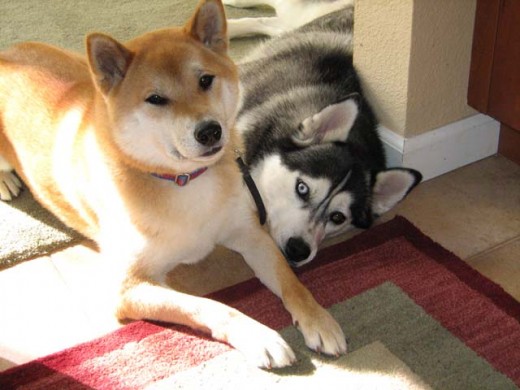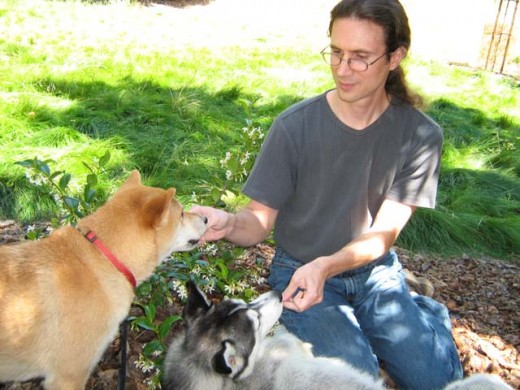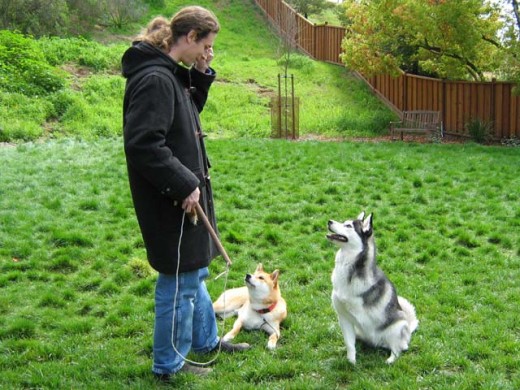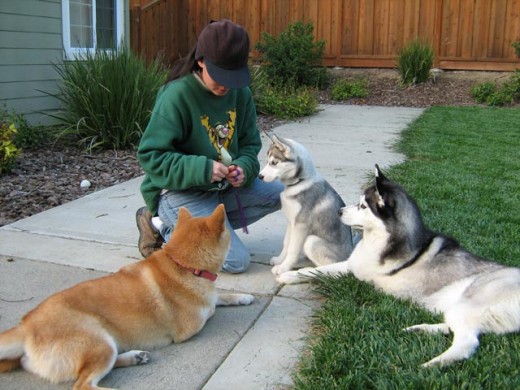Spanking, beating, and hitting a dog, is sometimes used as a form of dog discipline or dog punishment.
After all, biting a dog’s ear worked for Cuba Gooding Jr. in the movie Snow Dogs. Therefore, will such pain based techniques work for us too? To answer this question, we must consider how dogs learn.
Dogs learn through conditioning.
- They repeat behaviors that get them good results, and
- They stop behaviors that get them bad results.
Based on this, there are two schools of thought for stopping problem dog behaviors – reward obedience training and aversive obedience training.

Is It Bad to Beat or Hit a Dog?
Spanking, beating, and hitting a dog are all aversive techniques. Pain is delivered to sensitive areas of the dog, such as his ear or muzzle, when he performs a bad behavior.
The argument for this type of dog discipline, is that the pain will discourage a dog from repeating undesirable actions. Every time our dog does something bad, he gets an unpleasant result (pain), which will hopefully dampen his resolve to perform the same behavior.
However, the problem with aversive training, is that it is risky, too personal, and there is no good way to redirect the punishment.
Our dog knows that the pain originates from us, and is not a natural result of his actions.
As a consequence, our dog may end up learning the wrong lessons, including:
- Hitting, slapping, and biting is a fun game that my owner plays with me. Let me try playing it with him, and with others. A dog may arrive at this conclusion, when the pain is not delivered with enough force. Too much force, however, may result in fear aggression.
- A person’s hand or face coming toward me, is a bad thing. I should run away from people, or bite the hand or face that is a threat to me.
- My owner, or a person coming toward me, means pain. I should stay away from people, or keep them away by growling and biting.
If we do not deliver the pain with good timing, with the proper force, and in exactly the right circumstance, our dog may get confused as to why he is getting punished. He may become fearful and stressed, because he is unsure how he can stop the pain from recurring.
As a result, spanking, beating, and hitting a dog may lead to even more behavioral issues, including fear aggression as well as submissive urination.
For these reasons, using physical techniques to punish a dog, is not very good dog kung fu.

If Not Beating or Hitting a Dog, Then What?!
If beating or hitting a dog does not work, then how can we teach our dogs right from wrong?
How can we get our dogs to behave and not engage in destructive behaviors?
The answer lies in the other school of dog discipline, namely reward based techniques. Some positive based authors that I like include Patricia McConnell, Karen Pryor,
and Suzanne Clothier.
Contrary to what some may say, reward based methods does not just involve “giving food to our dog”. Rather, it allows us to gain pack leadership through the proper control of resources.


We may not realize this, but we already control all of our dog’s resources. For example, we decide when he gets to walk, when he gets to eat, what and how much he gets to eat, when he gets to play, what toys he gets to play with, when he has to go to sleep, what he can chew on, and much more. All we need to do, is teach our dog this fact –
He is NOT in control, WE are.
For example, if my dog jumps on me and bites my hand during feeding time, I tell him that this behavior is unacceptable, by using a no-mark. Then I ignore him, and he does not get his food, until he has calmed down. In this way, he learns that –
- Waiting calmly for his food in a down position = Get food quickly,
- Jumping and biting = Food preparation stops.
If he continues with his bad behavior, I say Time-out, and I remove him to a time-out area. This teaches him that if he cannot behave around people, then he does not get to be with people.
We respond to all other bad behaviors in a similar way – by restricting our dog’s access to his most desired resources, and only giving him rewards when he has earned them through good behavior.
Different dog behavioral issues will involve different tactics, but the overall strategy is one of resource control and proper management.

But Dogs Hit, Bite, and Physically Correct Each Other …
A common argument used to justify physical corrections, is that our dogs do that to each other, therefore, it must be natural and right.
It is true that dogs will sometimes hit and bite each other as a warning, or to correct behavior. Dogs also hit and bite during play. They are able to do this, because they have very good control of the placement and force of their bites.
However, dogs are not humans and *we* are not dogs. We do not have the same physical strengths or control as our dog. We do not have sharp teeth or claws, we cannot run very fast, and our jaws are not very strong.
This is why it is a very bad idea to physically challenge stray or loose dogs. Logic dictates that we do not wrestle, hit, or physically engage with unknown dogs, that may be aggressive. Similarly, we should not slap, beat, or hit our own dog either. Rather than do a bad job at pretending to be a dog, we should play to our human strengths.
As a human,
- We can open and close doors.
- We can drive to the store and buy food, toys, and other good stuff.
- We can open sealed bags, cans, bottles, and more.
- We can reason, build, and develop long-term plans.
In essence, our human abilities give us control of *all* the things that our dog needs or desires. This makes us into natural leaders, because by controlling the pack’s resources, we control the pack.

Finally, when a dog physically corrects another dog, the other dog may decide to fight back.
A puppy may allow an adult dog to correct him initially, but when he grows up, he may learn to respond in-kind with aggression. For this reason and more, I do not allow my dogs to physically correct or bully each other. As pack leader, I set the rules, and I enforce them through the control of resources. If there are any conflicts, my dogs will alert me. I will then do my best to resolve the conflict in a fair and consistent way, which does not involve any hitting, biting, or puncture wounds.
Just because a dog may sometimes hit and bite other dogs, does not mean that hitting and biting is good, effective, or even particularly humane. The assumption or assertion that physical punishment is better because our dogs do it, is a logical fallacy. In fact, there are many things that dogs do to each other and to other animals, that we need to manage, redirect, and retrain. This includes –
- A dog’s drive to hunt neighborhood cats,
- A dog’s instinct to guard resources (with aggression if necessary),
- A dog’s inclination to bully a weaker dog,
- A dog’s impulse to fight-back, and more.

Does Beating or Hitting a Dog Work?
Pain based techniques may stop problem behaviors in the short term, but it is not the most effective type of dog discipline.
There are many difficulties and risks that may cause our dog’s behavior to degrade, rather than improve. Using it to stop one problem behavior, may inadvertently cause five other bad dog behaviors to crop up. In addition, the effect of beating or hitting a dog may degrade over time, as our dog gets habituated to the pain.
In contrast, reward based methods are safer because there is little danger of our dog becoming fearful, aggressive, or stressed. We are not delivering any pain to him, but simply withholding the rewards that he has failed to earn.
- Reward based discipline encourages our dog to figure out how he can get in our good books, because that is the quickest way to get what he wants most.
- Aversive dog discipline, on the other hand, encourages a dog to avoid us because there may be pain involved.
Ultimately, resource based training allows us to forge a stronger bond with our dog, and makes him into a responsible canine, who works for what he wants.
The greatness of a nation and its moral progress can be judged by the way its animals are treated.
~~ [Mahatma Gandhi]


Hi , me and my boyfriend have a German Shepard / Pitbull mix. He’s about 1 yr 3 mo now. He isn’t violent but he is very obnoxious , also he does not Listen to me. He will do whatever my boyfriend tells him but when it comes to me , he will do the opposite. He will poop in the house even after we would take him outside to poop , and he would poop. Then do the same inside. He knows he does wrong because he will run to his cage as soon as he poops. But he knows every time he does wrong and just takes the spankens. I am so lost on how to fix it. We got him at about 8 months old and he was NOT trained properly at all by the previous owners. Any help ?
How I potty trained my dog.
I have a 12 month old border collie who I tried spanking when he would do something wrong, like stealing a jolly rancher from the table. I spanked him and he whipped his head back, lips upraised ready to bite me. It got out of control today and he punctured my hand real good. I’ve been told when bcs do that you flip them on their back and wait for them to exhale…but I’m at a loss because we both get so upset and it doesn’t do anything but make the situation worse. He does great with his meals and he waits patiently till I say “ok” so he can eat, but when it comes to food he steals he won’t drop anything willingly. I’ve tried teaching him but it doesn’t work unless i have food readily available in my hand. I love my dog and I want to learn to treat him the way he deserves to be treated without getting upset and handling the situation wrong
NEVER EVER EVER hit a sensitive breed like a border collie! EVER.
They are extremely easy to upset, and extremely unforgiving and can hold a grudge against another person or animal for YEARS for something very minor – hitting is sure to cause bad blood between you and make your relationship breakdown.
I never once hit my border collie and in return, he never once bit, growled at or threatened me.
He too was terrible at stealing things he found on the floor outside (he never stole inside the house but outside he thought everything was fair game).
Prying the object out of his mouth didn’t work as he would just hold onto it tighter.
His “drop” command that I had taught him to drop his ball for me when we played fetch – didn’t work.
I tried dropping a bunch of keys near him to shock him into dropping it – that didn’t work.
I wasn’t going to hit him because he was a gentle, normally very well behaved dog and he didn’t deserve that kind of treatment from me.
Finally I tried tempting him to drop the stolen item with something yummier (he had a rancid half eaten bone from a broken rubbish bag on the street – I was using a piece of beef jerky to trade for the bone). When I offered him the jerky he instantly dropped the bone and took the proffered treat, I was then able to quickly grab the bone before he’d finished the treat and throw it away. No confrontation necessary, and instead of being angry at me for taking his bone, he wagged his tail and looked hopefully at me for more treats.
After that it became easier to do the “trade” for something he wasn’t supposed to have. I’d say “trade” and offer him something else, and eventually (after a few trades) just say “trade” and he’d drop whatever he had and come to me (looking for a treat).
Try it!
Hi! Okay so I am desperate! I have had my chihuahua terrier mix since he was 3 weeks old. He’s my baby. And now he’s about to turn 2. Most of the time he is the sweetest little dog, unless you are disciplining him. We used to spank him when he would mark his territory in the house and he would bite us. Eventually we stopped doing that because of things we’ve read like this post. And so then we started to smack him on the nose and say ”no toby, don’t potty in the house” but he’d still bite us when we’d smack his nose. And now we’ve done away with hitting completely and just say “bad toby, don’t potty in the house” or whatever and then put him in his cage. But he bites us when we try to grab him to put him in the crate. It’s gotten to the point to where my little itty bitty dog is actually hurting us. Somehow when he bit my husband he just about ripped his fingernail off. My husband is tired of it, but our dog is a part of our family and I REFUSE to get rid of him. I just need help. Please. Any advice? Anything at all.
How I deal with puppy biting.
How I potty train my dog.
However, dog behavior is very context dependent, so each dog and situation are different. Based on what you describe, I would get help from a good professional trainer.
https://www.aspca.org/pet-care/general-pet-care/behavioral-help-your-pet
https://apdt.com/pet-owners/choosing-a-trainer/
I have a sweet and silly 1 year old sibe and would love advice on how to “undo” the negative discipline my boyfriend has taught her. He’s very physical with her while playing and especially when disciplining to the point where she will cry/yelp and has now started to seriously bite back, enough to draw blood. I believe it is his fault as she has never shown any aggression towards anyone else and this issue most likely comes for fear or pain inflicted on her. How can I work with both of them to fix the problem before it gets any worse?
I’ve got two Great Danes. Male and female. My male is attached to the hip with my wife and tends to chew on everything in site. The female is the dominant one and never listens to anything we tell her to do. In fact she’ll do the opposite sometimes. And if I try and tell her to do something she’ll start play fighting with me while barking and growling and jumping around like a crazy dog. I have no idea what to do anymore. The male is 2 and the other is 3.
I whooped my dog with a news paper when I first got her because of her barking and trying to bite new people. It took a while but she understands barking and trying to bite results in getting hit. No more problems. I don’t recommend doing this often . I only did it twice in one day and since then she no longer behaves that way. In essence she submitted and understands I am not a threat, but I’m and boss. It may seem cruel but some dogs only obey with force. If your not able to stay calm in this type of situation.I advised you to find a professional
We adopted a Chiweenee about 2 years ago, he is now 4 years old. He is very loving to my husband and I. He is loving to our son, but if our son gets too close to me, our Chiweenee is very protective and gets aggressive and tries to attack and bite. Our Chiweenee barks aggressively and tries to attack and bite anyone who enters our home also.
What you describe sounds like resource guarding behavior. Some dogs may guard food, toys, sleeping area, or they may guard their primary owner, who is a very valued resource indeed. As you describe, this behavior can become dangerous, as it may cause a dog to show aggression towards other members of the family, guests, or other dogs.
When did your dog start showing this behavior? How serious are his “attacks and bites”? Does he do this every time or only sometimes? What is the context when he shows this behavior? What do you do when your dog shows this behavior? How does he respond?
Based on what you describe, it is best and safest to get help from a good professional trainer who understands desensitization and counter-conditioning techniques.
https://www.aspca.org/pet-care/virtual-pet-behaviorist/finding-professional-help
https://apdt.com/pet-owners/choosing-a-trainer/
I help my dog with resource guarding issues by doing two key things-
1. I help him associate people coming towards him (and his guarded-resource), to be a very positive thing. I use desensitization and counter-conditioning techniques to do this. For desensitization training to “work”, it has to be conducted in a structured environment and in a very specific way. When I started doing desensitization exercises with Sephy, I did so under the direction of a good trainer/behaviorist.
In general, I manage my dog’s environment and routine so that I do not expose him to situations that will trigger a bad reactive episode. Reactive episodes will set back our training, cause him to form more negative associations towards other people, and worsen his future behavior. Prevention is always best with my dog.
2. If I am unable to totally prevent, then I make sure to stop my dog’s behavior *before* it escalates and he loses control.
As soon as I notice my dog start to show signs of tension, I redirect by giving him a very simple, pre-trained command (e.g. Sit). If he redirects, then I reward him with my attention and other rewards. If he continues with his reactive behavior, then he may lose access to the room. If he continues to be reactive outside the room, then I say time-out and put him temporarily in a safe time-out area. In this way, my dog learns that-
Sit = Get lots of attention from me and other rewards,
Reactive behavior = Temporarily lose access to me and may temporarily lose his freedom in the house.
I use leashes, gates, and other management equipment to make sure that everyone is always safe.
The article below has more on dogs who guard their owners.
http://www.associationofanimalbehaviorprofessionals.com/green-eyed_monster.html
However, dog behavior is very context dependent, so in cases of aggression it is best to get help from a good professional trainer/behaviorist.
I adopted a 5 years old dog, and the owner before me usually beat up the dog. Is there anything i can do to manage my dog? Because it always angry toward certain action that we do, maybe because it think that we want to hit him. Please, is there any suggestion?
What actions exactly trigger his reactive behavior? What exactly do you mean by “it always angry”? Does he try to bite, growl, air snap, or something else? What does he do, what do you do in response? What kind of a dog is he? Big dog or small dog?
The first thing that I do is try to identify what things are triggering my dog’s behavior and why, e.g. is it from fear? After I identify these things, then I can come up with a good plan for managing my dog and retraining him. Dog behavior is very context dependent, so for dog aggression issues, it is always best and safest to get help from a good professional trainer.
https://www.aspca.org/pet-care/virtual-pet-behaviorist/finding-professional-help
I help my dog be more comfortable with people by doing desensitization and counter-conditioning training.
http://shibashake.com/dog/how-to-calm-a-fearful-reactive-dog#people
https://www.aspca.org/pet-care/virtual-pet-behaviorist/dog-behavior/desensitization-and-counterconditioning
More on how I change my dog’s behavior.
I have a 7 month old white german shepherd (gigi) who we just got a month ago. We also have a 6 year old bichon poodle who we are sure is pregnant. No matter what gigi will not stop biting on Baileys ears, pulling on her tail, ect. Gigi also will not stop biting people, we spand her on the butt, tell her no, then put her in time out in the laundry room. When she comes out she is fine for about 30 mins then goes back to biting. Any advice?
I deal with my puppy biting by doing 3 things-
1. Bite inhibition training.
2. No-bite conditioning.
3. Structure and impulse control training.
http://shibashake.com/dog/puppy-biting-how-to-stop-puppy-biting
http://shibashake.com/dog/puppy-biting-tips-solutions
More on how I trained my puppy.
More on how I help my dogs get along.
ASPCA article on puppy socialization.
Hey 🙂 Thank-you for this post.
I am from India and I have a 4 month old stray dog that I adopted around 3 months ago. His name is Toby. He is an intelligent dog; he has learnt to poop in a certain designated place, had learnt to sit and lie down. But he hasn’t learnt not to pee in the house, however much we put him outside. I even stopped him during the act and put him outside, and gave him a treat afterwards, but he doesn’t seem to understand.
He recently fractured his leg and went through the surgery, and since that time he has started being very disobedient and stubborn. No amount of shouting or scaring him is helping. We are getting very very frustrated. 🙁
It’ll be kind of you to help me out in this!!
When I started “training” my dog, I also used aversive training. However, as you say, scare tactics did not work well, and only made his behavior worse. I talk about why in the article above.
More on how I potty train my puppy.
More on how I trained my puppy.
More on how dogs learn.
my about 10 month old boxer puppy is mostly potty trained but he doesn’t get how to tell me he has to go potty I don’t understand how to get him to tell me this my other dog acts crazy and starts barking at us wen she has to go but I can’t get him to notify me help plz it feels hopeless
How are you potty training your puppy?
When I potty train my dog, I consistently take her outside through the same door. Some people may install a bell by the door, and then ring the bell before taking their dog outside.
After I repeated this process very consistently, a bunch of times, my puppy associated the door with going outside. Therefore, now when she needs to go, she walks to the same door and waits there. I know that when she does that, she wants or needs to go outside.